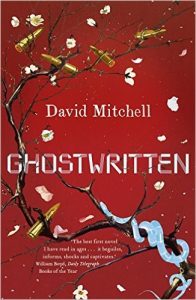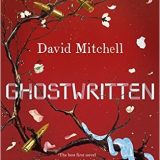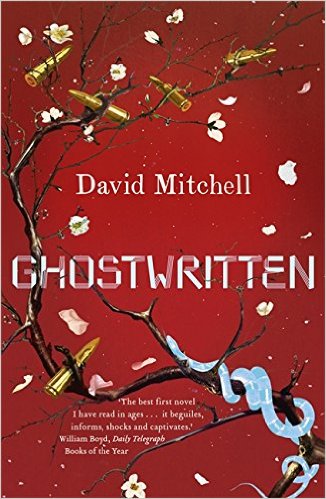Ghostwritten – David Mitchell – 1999

Reviewed by: Anna van Gelderen Date: 5 May 2002
An unusual novel: a number of highly intriguing stories, at first sight unrelated but really tenuously and enigmatically connected, moving from Japan, Hong Kong, mainland China, Mongolia, St Petersburg and still further west.
 Okay, the novel’s ending is flawed, but what a marvellous book! I can easily forgive it its flaws for the joy it has brought me. Every episode has a new voice and all the voices are so individual, so utterly convincing that time and again I was dragged along deep into each story, even though at each new story it took some refocussing to get to grips with the who, what and where. Actually, I found this one of the advantages of the episodic set-up: it forced me to stay alert all the while, not only because every time I had to figure out what each story was about, but also because I was constantly on the look-out for connecting threads between the stories. David Mitchell’s real forte, however, is his effortless style. Every voice sounds true and just right, and the themes and metaphors – the novel’s deeper layers – are so lightly interwoven with the stories that they form an integral part of the whole and are never forced upon you.
Okay, the novel’s ending is flawed, but what a marvellous book! I can easily forgive it its flaws for the joy it has brought me. Every episode has a new voice and all the voices are so individual, so utterly convincing that time and again I was dragged along deep into each story, even though at each new story it took some refocussing to get to grips with the who, what and where. Actually, I found this one of the advantages of the episodic set-up: it forced me to stay alert all the while, not only because every time I had to figure out what each story was about, but also because I was constantly on the look-out for connecting threads between the stories. David Mitchell’s real forte, however, is his effortless style. Every voice sounds true and just right, and the themes and metaphors – the novel’s deeper layers – are so lightly interwoven with the stories that they form an integral part of the whole and are never forced upon you.
One of the novel’s most important themes is chance versus fate and the way trivial actions (like phoning a wrong number in one of the first episodes) can have a deep and lasting effect on people far away you have never even heard of. Central in more than one way, therefore, is the marvellous, dreamlike episode set in Mongolia. For the story from his childhood the origin of which the narrator is so desperately seeking, sums up very beautifully the novel’s view on chance and the role of cause and effect.
It goes like this:
“There are three who think about the fate of the world. First there is the crane. See how lightly he threads, picking his way between the rocks in the river? Tossing, and tilting back his head. The crane believes that if he takes just one heavy step, the mountains will collapse and the ground will quiver and trees that have stood for a thousand years will tumble. Second, the locust. All day the locust sits on a pebble, thinking that one day the flood will come and deluge the world, and all living things will be lost in the churn and the froth and black waves. That is why the locust keeps such a watchful eye on the high peaks, and the rainclouds that might be gathering there. Third, the bat. The bat believes the sky may fall and shatter, and all living things die. Thus the bat dangles from a high place, fluttering up to the sky, and down to the ground, and up to the sky again, checking that all is well.”
In short: a rich and rewarding book.
















